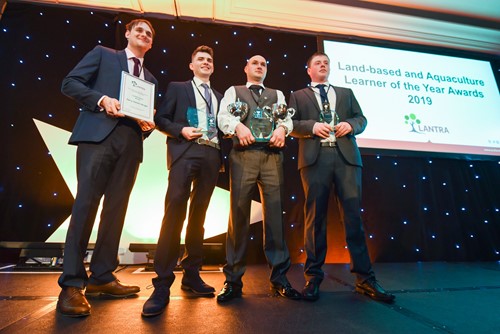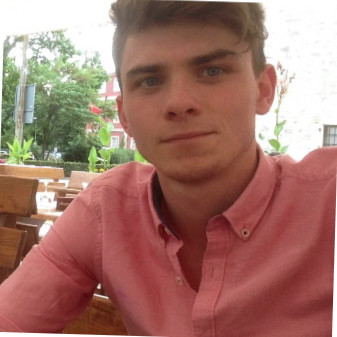Guest blog: Things I wish I'd known after graduating
Andrew Richardson – winner of the 2019 Lantra Higher Education Learner of the Year Award – is originally from Skye, but is now studying for his Erasmus Mundus MSc in Crete.
Sitting on the balcony of my flat in Crete, sipping a strong black coffee, it's hard to believe I used to hold the opinion that there were too few opportunities for young aspiring aquaculturists. Having the opportunity to travel across Europe for two years, as a part of my Erasmus Mundus MSc, has opened my eyes! This experience has culminated in a dissertation project, utilising insect-based feeds, at the University of Crete here in Heraklion. It’s been a long road filled with internships, conferences and seminars. Finishing my degree, a BSc in Marine Biology, I saw low levels of industry involvement and (outside of an academic path) few serious career options. In a panic, I sent out a flurry of emails, searching for a first foothold, all whilst friends fielded offers for graduate positions from their respective industries. One such email, to the only company who had presented a guest lecture during my undergraduate degree, yielded results – an internship! This became a job, which after two years helped me land a full scholarship for my MSc. Over the last couple years I have seen so much, and learnt a lot. Here are just a few of the things I wish I had known when I initially graduated.
Communication
Whilst a challenge as an inexperienced graduate, embedding yourself in the industry through communication and attendance of events is never time wasted. There is a wide variety of conferences both in Scotland and internationally: from careers fairs (Aquaculture Students Association careers day); industry exhibitions (Aquaculture UK 2020); the annual European Aquaculture Society (EAS) events for academics and industry (this year held in Berlin); to smaller, more specifically targeted events such as the Zero Waste Scotland insect farming workshop held recently in Edinburgh. Attending events, talking to employers, shaking hands, getting email addresses, and handing out cards (get one for yourself!) is a vital part of networking and yields results! Equally, your fellow students are absolutely worth your time; they will have completed internships you have never heard of or be able to offer advice that couldn't be more relevant. If you have an EAS membership, you are automatically enrolled in their Student Group, which is very active, very large, and has a growing voice!
If funding these conferences is a concern, and they are often not free, then do not rule them out immediately. The EAS offers jobs at conferences with some flexibility so you can still – affordably – attend. SAIC offers travel grants for European and international conferences – find out more here. In addition, all universities have pots of money reserved for conference attendance or extracurricular learning opportunities. I was fortunate enough to be directed towards the UHIs Student Development Fund, which paid my conference ticket for last year’s Joint WAS/EAS Aquaculture Conference in Montpelier. It was a fantastic five-day experience I won't soon forget!
Experience
Unfortunately for those of us starting out, experience is held at a premium. Aquaculture is an industry, and a highly competitive one. As such, companies expect a lot of their recruits. Fortunately, there are a whole bunch of interesting internship opportunities that can give you an edge. SAIC offers a huge amount of help securing these, so you are on the right website! If you fancy a summer abroad, a host of companies offer internships in Europe, and this can help to further stand out in the crowd. I have also been told by multiple employers that, as aspiring fish farmers, it’s a great idea to get out and farm fish! It absolutely remains one of the key factors looked for in a CV.
Recognition
You are building a wealth of experience and are starting to cultivate that network, but people need to hear about it! This reinforces to those employers who you are, shows your continued development, but is also really rewarding. You put in the work, so be LOUD and PROUD! Get a LinkedIn profile, go on Twitter. When you finish an internship - tell people. Going to a workshop? - tell people. Get involved in industry networks – for example, the recently formed WiSA (Women in Scottish Aquaculture), and if you are proud of an aquaculture achievement, reach out!
Outside of that, there are schemes like the Lantra Land Based and Aquaculture Learner of the Year Awards – get yourself nominated! I was nominated by one of my professors, and it has been fantastic for my confidence. In the application I detailed my work at two internships, the societies I was active in and my ambitions for the future. Winning an award has opened many doors, and it validating to have your hard work recognised. There is a wide range of awards, for every level of the learning experience from apprenticeships to higher education (the category I won). It’s a fabulous night, attended by a lot of industry representatives!
And finally? Enjoy it. I have found so much satisfaction and pleasure thus far. I’ve travelled to five countries, met hundreds of amazing people, and I’m really excited for the future. All that’s left to do is finish my coffee… and this MSc dissertation…

Pictured left-right: CARAS winner Harry Hamlin-Wright from Dawnfresh Farming Ltd, Higher Education Award Winner Andrew Richardson currently undergoing an Erasmus Mundus joint masters degree in Aquaculture, Environment and Society through the Scottish Association for Marine Science UHI, Modern Apprentice of the Year, Janis Brivkalns currently undertaking a Modern Apprenticeship in Aquaculture with The Scottish Salmon Company through Inverness College UHI and Aquaculture Learner of the Year Runner-up Billy Welsh who has been doing a Modern Apprenticeship in Aquaculture with Scottish Sea Farms through NAFC Marine Centre UHI.
Want to guest blog for SAIC? Get in touch!Share this
